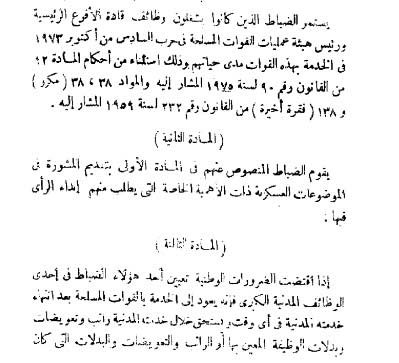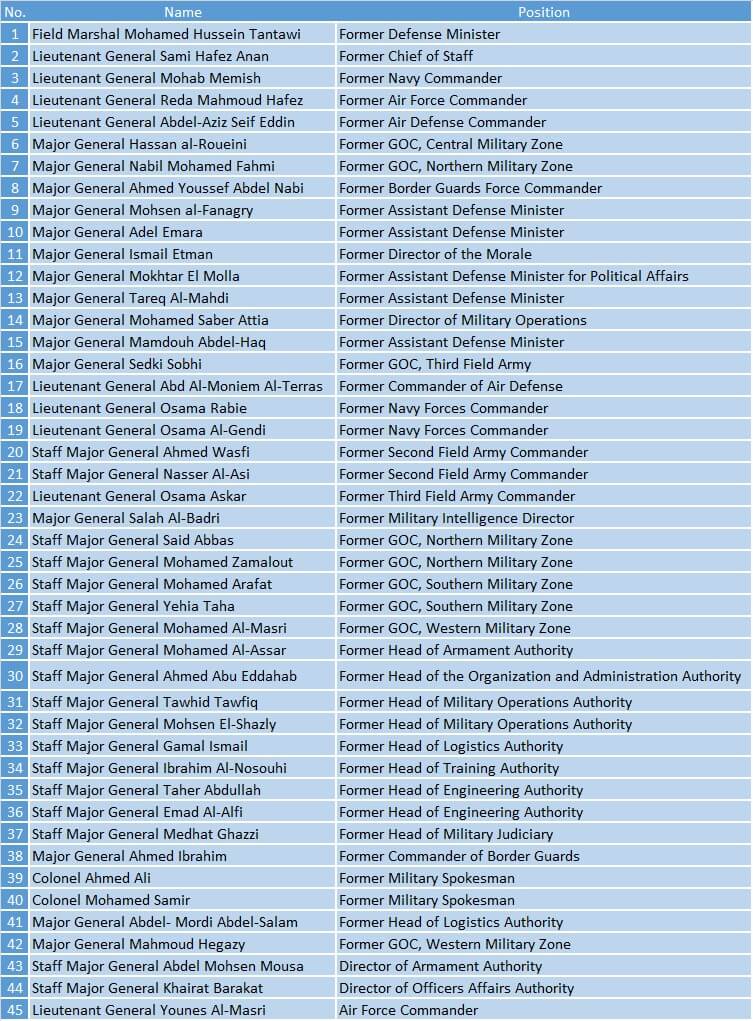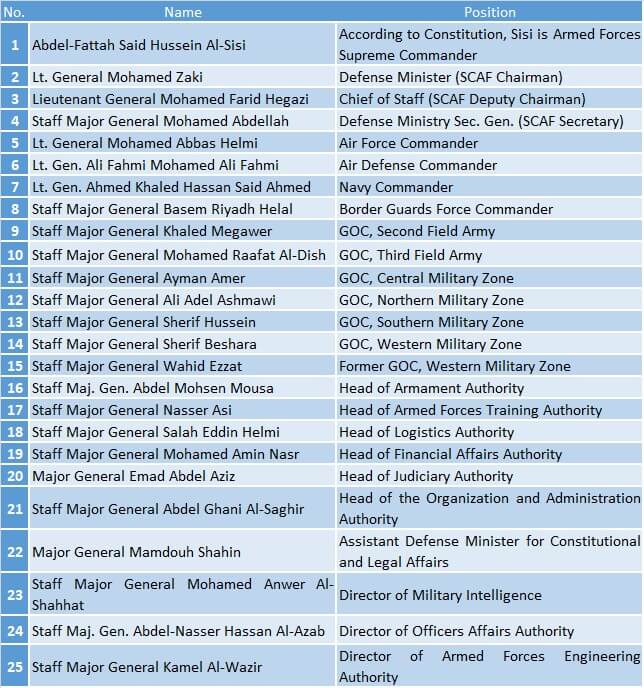
Behind Egyptian Law on Treatment of Senior Army Commanders
Behind Egyptian Law on Treatment of Senior Army Commanders
On Tuesday, July 3, 2018, members of the Egyptian House of Representatives (parliament) approved the articles of the “Law on Treatment of Some Senior Armed Forces Commanders”, which Abdel Fattah Al-Sisi, being the supreme commander of the armed forces, referred to parliament for ratification.
First: The draft law
Article 1 of the draft law states that: “Senior commanders in the Armed Forces who are named by a presidential decree shall be summoned to serve the Armed Forces for life. Those who currently hold a position outside the Armed Forces shall be summoned immediately after completing their position.” This means that those “senior officers” will be summoned to serve the Armed Forces during their lifetime, and that those who are holding a civilian post will be recalled to the army service soon after they complete their term in office.
Article 2 stipulates that the: “Senior commanders in the Armed Forces, referred to in Article 1, who have not previously held a ministerial or higher position, shall be treated as a minister, and shall enjoy all privileges and rights stipulated for government ministers.”
Article 3 states that: “A presidential decree shall determine the privileges and other allowances enjoyed by the subjects of this law. The privileges and allowances established under the provisions of this Law may be combined with any privileges established under any other law.”
Article 4 stipulates that: “The persons referred to in Article 1 shall be awarded, by this law, medals of honor as determined by a presidential decree.”
Article 5 states that: “No investigation or judicial action may be initiated against any of the parties to the provisions of this Law for any act committed during the period of suspension of the Constitution until the date of the commencement of the work of the Council of Representatives, during the performance of their positions or because of them, except with the permission of the Supreme Council of the Armed Forces.”
Article 6 stipulates that: “The persons who are addressed by this law, while traveling abroad, shall enjoy the special immunities stipulated for the heads and members of diplomatic missions throughout the duration of their service and the duration of their summons; and the Ministry of Foreign Affairs shall take all necessary measures to that end.”
Article 7 provides that: “This Law shall be published in the Official Gazette and shall come into force as of the day following the date of its publication. This law shall be stamped with the seal of the state, and enforced as one of its laws.”
Second: Justifications provided by the State
Maj. Gen. Mamdouh Shahin, Assistant Minister of Defense for Legal and Constitutional Affairs and one of the army commanders who are still members of the Supreme Council of the Armed Forces (SCAF), said that the Law on Treatment of Some Senior Armed Forces Commanders is not discriminatory, citing Law No. 35 of 1979 to honor the commanders of the October War, that was issued by the late President Anwar Sadat. Shahin stressed that the new law in question does not have any problematic on discrimination; saying: “I am now recalling Law No. 35 of 1979 on honoring the commanders of the October War.” He added: “Other honors have been issued on several occasions, and honoring some commanders is a tribute to all the armed forces. This is not discrimination but a tribute, and we thank the parliament for their support and development of the armed forces,” Shahin said.
For his part, Ali Abdel-Al, the Speaker of the House of Representatives, said that the Law on Treatment of Some Senior Armed Forces Commanders is not discriminatory, and that it is constitutional, adding that: “Honoring those who sacrificed their souls in redemption of their country is not considered any form of discrimination.” Abdel-Al said that the commanders of the October War were honored and this was not considered discriminatory. “This law has already been challenged before the Supreme Constitutional Court which has not responded to such appeal,” Shain said, adding “I am well assured that there is no discrimination at all in this law.”
MP Salah Hasballah, the media spokesman for the House of Representatives, said: “Since January 2011, Egypt has been subjected to serious turning points and state of insecurity, and this national army has stood by its people, backed and sided with them; and I agree to any law that honors members of the armed forces starting from the lowest soldier up to the highest commander, which is a national duty.”
In the same context, MP Mostafa Bakri said that “Since January 25, 2011 up to now, the armed forces have faithfully and sincerely performed their role out of national creed, and fulfilled their constitutional entitlements, including the handover of power to an elected civilian president, and sacrificed for the sake of the homeland.” Bakri continued saying, “There is an important example for this, namely Field Marshal Mohamed Hussein Tantawi, who should be honored in recognition of his role in the defense of the homeland.” Bakri paid tribute to the martyrs of the army and police, adding: This is a law of loyalty and we thank the Supreme Commander of the Armed Forces (Sisi) for this honor and tribute to the men who have sacrificed for the homeland. This law is not a blessing from anybody; and this is Major General Mamdouh Shahin, Assistant Minister of Defense for Legal and Constitutional Affairs, who was a witness to this period and played a role in saving the country.”
MP Magdi Morshed said: “I express my reservation that this law only included the senior commanders; and I say clearly that all officers of the armed forces should be included and given moral honor within this law.”
Third: Implications and interpretations
1- Law 35 of 1979 and the Law on Treatment of Senior Commanders of the Armed Forces: Paradoxes and Variations
Maj. Gen. Mamdouh Shahin, Assistant Minister of Defense for and Legal and Constitutional Affairs, cited Law 35 of 1979 issued by President Anwar Sadat, saying that the Law on Treatment of Senior Armed Forces Commanders, which Sisi has referred to the parliament for ratification, is inspired by that law (Law 35 of 1979), as Law No. 35 of 1979 stipulates the following:
Article 1: The commanders of the main branches of the armed forces, namely: the Minister of Defense, the Chief of Staff, the Commander of the Air Force, the Commander of the Air Defense, the Commander of the Naval Forces, and the Chairman of the Armed Forces’ Operations Authority during the Six October War shall continue to serve in the armed forces for life, i.e. a total of six military commanders; and the legislative committee of the People’s Assembly at the time ratified the law and stated in its draft that the law applies to a limited number of senior commanders, as it is difficult to expand the application of the law. The parliament committee also said it viewed the honoring of these commanders as a tribute to all members of the armed forces. Law 35 of 1979 also states in Article 2 that these commanders shall provide advice and express their views when requested and are considered lifelong advisers in military matters.


In Law No. 35 of 79, former President Sadat named the senior commanders of the armed forces within the law provisions, which was not done by Sisi in the law that has just been passed. The latest law only stipulates that the names of these commanders will be decreed by Sisi later. Some expect that Sisi will name the commanders of the military junta who joined SCAF from the time of the January revolution to the present time: about 71 military commanders that will be addressed in detail later. Also, President Sadat did not protect the military commanders of the October War from any prosecutions in the case of committing any acts against law, but he only considered them as military commanders in service for life and gave them some financial privileges, contrary to what Sisi has done of providing them with protection from any prosecutions, for the first in Egypt.
It should be noted that former President Mohamed Hosni Mubarak was the commander of the Air Force at the time of the Six-October War. In spite of the existence of Sadat’s law (No. 35 of 1979), however, it did not protect Mubarak from being brought to courts for trial after the January Revolution. Even if such laws were meant to provide immunity for the army commanders, they become void in the case of the outbreak of revolutions and changing the political regime in the country. It is noteworthy that Farid El-Deeb, Mubarak’s lawyer, resorted to Law No. 35 of 1979, as an attempt to prevent holding Mubarak accountable for his alleged crimes, but jurists refuted this attempt as wrong deduction.
2- Message of reassurance and reduction of conflicts
The Law on the Treatment of Senior Commanders of the Armed Forces comes after Sisi’s restructuring of SCAF. The military council that participated in the military coup that Sisi led against President Mohamed Morsi has almost been completely changed except for only three commanders, namely Lt. General Mohamed Farid Hegazi, former Secretary-General of the Defense Ministry and current Chief of Staff; Major General Mamdouh Shahin, the Assistant Minister of Defense for Legal and Constitutional Affairs; and Major General Mohamed Amin Nasr, the Chairman of the Financial Affairs Authority of the Egyptian Armed Forces. Observers say that some commanders who were removed from SCAF were dissatisfied with Sisi’s decisions and believed that they were being sacrificed. Furthermore, such commanders were frightened of being exposed to prosecutions at home or abroad in the event of any change in Egypt’s internal situation. Such change is expected to occur as highlighted by some indicators in light of the Egyptian regime’s failure to face the country’s internal crises. Therefore, Sisi probably wanted to reassure those commanders who left service that they are protected from any abuse that could be inflicted on them both at home and abroad, in addition to giving them many personal privileges.
Some explained Sisi’s move to issue this law at the present time as a desire on his part to calm the fears of army commanders who have been feeling uneasy since the sacking of former Minister of Defense Sedki Sobhi [although he had been protected by the Constitution from dismissal for a period of eight years (two terms in office) or at least this is what the Sisi intelligence services were circulating since Sobhi’s appointment in his post in March 2014] and the exclusion of most of Sisi’s coup allies within the army. Sisi wanted to send them a message that the dismissal of Sobhi is a normal legal procedure, that none of them will be threatened, except with the permission of the SCAF which he himself appointed, and that all of them have been granted the advantages of ministers. This is a classic carrot-and-stick policy to reward his allies and at the same time warn them that he still has the power to prosecute them. Therefore, some suggested that Sisi wanted to provide those senior commanders with many privileges (as a kind of bribe) to prevent them from carrying out any hostile acts against his regime. At the time Sisi gives them all these privileges to earn their loyalty, he still retains all the tools of abuse that can be used against any one of them when needed, as he did with former Chief of Staff Lt. General Sami Anan when he announced his intention to run against Sisi in the presidential election of 2018 without obtaining the SCAF approval. This was clear in Article 5 of Sisi’s law which stated that “No investigation or judicial action may be initiated against any of the parties to the provisions of this Law for any act committed during the period of suspension of the Constitution until the date of the commencement of the work of the Council of Representatives, during the performance of their positions or because of them, except with the permission of the Supreme Council of the Armed Forces.”
3- New rules of treatment among military commanders
Some believe that the military commanders that were removed from the SCAF practiced pressure on Sisi to issue laws to protect them from abuse and prosecution, after their removal without any procedures to secure them from internal and external prosecutions – as happened with Lt. General Mahmoud Hegazi during his visit to the United Kingdom in 2016 and the events that took place during that visit, especially what was said at the time that Hegazi was to be arrested for some lawsuits raised against SCAF members by some rights activists for the crimes they have committed since July 3, 2013.
Some believed that Sisi’s action against former Chief of Staff General Sami Anan had caused tension among the senior commanders of the armed forces. Some of the military commanders were the idea of the abuse that Anan was exposed to, and that the image of the military institution was somehow distorted to the public opinion. Therefore, they practiced pressure on Sisi to issue laws for governing the military institution in cases of disagreement, while maintaining significant privileges for the senior commanders of the armed forces.
Fourth: Senior commanders of the armed forces
Article 1 of the law states that Sisi will name some of the senior commanders addressed by the law, but it does not mention any of these names. However, the commanders who will be included in this decision are expected to be the commanders who joined the SCAF from the January Revolution in 2011 to the present time, according to Maj. Gen. Mamdouh Shahin and MP Mostafa Bakri. The following table shows the military commanders who served in the Egyptian army but were later dismissed from service, and are addressed by the Law on Treatment of Senior Commanders of the Armed Forces:

In addition, the current military junta commanders are:

Conclusion
Sisi is carrying out more measures that give senior Egyptian military commanders a lot of personal privileges to win their loyalty and prevent any aspirations or hostile attempts on their part against him (Sisi) during his second term. This comes after Sisi’s policies over the past five years raised a lot of hostility against him within the military institution. On the other hand, Sisi is imposing strict control on senior Egyptian army commanders, especially those whom he removed from their senior positions within the military.
Through the developments in the military institution during the past five years, Sisi succeeded to take control of all the security and information systems as well as centers of power and control joints within the military; and based on this control, Sisi is overlooking any opposition voices within the military, and represses anyone that he thinks might cause him any threat.




